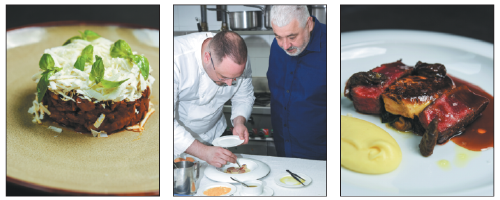Six years on, Bombana still enjoys causing a stir


Two opera singers perform the aria Nessun Dorma from the corner of a room that's reminiscent of an opera house. Guests tuck into cavatelli and carnaroli rice while they listen intently.
This was the scene at Opera Bombana during a gala dinner to mark the Italian restaurant's sixth anniversary in Beijing. The owner, Umberto Bombana, who is known as the king of white truffles, joined forces with the restaurant's new executive chef, Eugenio Iraci, to present a delicate six-course meal to the capital's foodies.
Besides offering classic Italian dishes, Bombana and Iraci created dishes like David Blackmore tenderloin and pickled mackerel in sweet-and-sour onion marinade for the celebration.
"We cook the fish in the traditional way, but we also add sweet-and-sour flavored onion to balance the flavors of the dish," says Bombana, who believes this is the most important aspect to creating a new dish.
"When you cook protein like meat or fish, you have to make sure that the flavor matches very closely with the other layers of flavors you create around it," says Bombana. "That's what I like to do - balance each layer of flavor."
Bombana often looks to nature for inspiration for his new dishes - and sometimes he likes to take a familiar ingredient and look at it from a different angle.
"What nature gives you, you cook," he says. "And then I use my creativity to balance the dish."
Born in Bergamo in northern Italy, Bombana was inspired by his grandmother, who used to cook for an aristocratic family.
In 2010, he opened 8 1/2 Otto e Mezzo Bombana restaurant in Hong Kong, which became the first three-star Michelin Italian restaurant outside of the country in 2012.
The name of the restaurant is a tribute to his favorite Italian film director Federico Fellini's autobiographical movie 8 1/2, which was released in 1963.
Bombana expanded the Otto e Mezzo brand to the Galaxy Macao in 2015, which was awarded one Michelin star, before opening Otto e Mezzo Shanghai a year later, which now holds two stars.
He opened Opera Bombana in 2013. He named the restaurant Opera because the space has the feel of an opera house and he wanted to present diners with an operatic medley of dishes.
"Each restaurant has its own personality so I don't like to give them the same name," he says.
According to Bombana, if the customers like certain dishes at Opera, they will stay on the menu. At the same time, he likes to change the menu every month by introducing two or three new dishes.
Bombana's goal for Opera is to gain a Michelin star when Michelin lands in Beijing. "To gain a Michelin star, the most important thing is the cleanliness of the flavors," he says.
Bombana worked on collaborations with chef Andre Chiang in each other's restaurants. They teamed up on two separate occasions, once in November and once February, to offer a blend of Italian and Sichuan cuisine at Opera Bombana and The Bridge in Chengdu, Sichuan province.
The duo saw the similarities between the two cuisines, and worked to devise a menu that harmoniously combined the spiciness of Sichuan cuisine with the fragrance of truffles.
Thanks in part to this collaboration, Bombana understands how hard it is to master Chinese cooking since it covers such a range of different cuisines, and he is looking forward to cooperating with more Chinese chefs.
He is also impressed by the flavors of Chinese ingredients. "For example, in Yunnan province, even the fruit is really nice, and the matsutake mushrooms are amazing - the intensity is like the white truffle," he says.
Bombana believes Italian cuisine is simpler than French cuisine, which includes many sauces. "I like pleasing Asian people with my food from the heart," he says.
He describes his cooking style in three words - simplicity, kindness and freedom.
"I like freedom in every sense. I like freedom to see things in different ways, and I like the freedom to create new dishes. But respect comes first: We need to respect people and the ingredients."




































